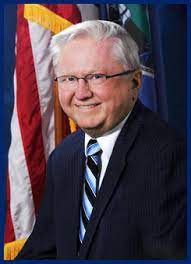The state’s top banking regulator is sounding alarm bells about a company operating as a new type of financial institution that allows affluent investors to borrow against alternative assets that can be hard to turn into cash.
In a letter to key lawmakers with footnotes, State Bank Commissioner David Herndon said there are “deeply concerning issues” arising from the institution known in financial parlance as a Technology-Enabled Fiduciary Financial Institution – also known as a TEFFI.
Herndon authored a four-page letter to lawmakers laying out several issues related to Beneficient Fiduciary Financial LLC, which is the first of its kind in Kansas.
The commissioner raised concerns about the company’s intertwined relationship with a company facing an investigation from the Securities and Exchange Commission as well as the inability to get audited financial statements.
“While some of our original concerns from this time last year have been resolved, new and more deeply concerning issues have arisen,” he wrote in the letter obtained by the Sunflower State Journal.
In response, Beneficient’s president and chief fiduciary officer, Derek Fletcher, sent a letter to lawmakers explaining that the banking commissioner has not raised any of the questions in his letter with company executives.

“Quite frankly, I am frustrated and disillusioned that despite our repeated requests, the commissioner is unwilling to engage with us — the very company he is charged with regulating,” Fletcher wrote.
“To suggest that he has legitimate concerns when he has made no effort to address those concerns with us is patently unfair. As a result, we find ourselves once again reaching out directly to you to correct a variety of misunderstandings and misstatements.”
The Kansas Legislature created the so-called TEFFI in 2021, with the goal of giving sophisticated investors the ability to liquidate alternative assets such as venture capital and private equity that aren’t easily converted to cash.
In reporting Beneficient’s formation in 2018, the Dallas Morning News reported that the company was homing in on 1.3 million “ultra-high-net-worth households,” or people with assets between $5 million and $25 million, because they already held alternative investments.
The company also planned to pursue institutions with less than $1 billion in assets, as well as private equity funds, the newspaper reported.
Brad Heppner, who founded the Beneficient, told the Morning News that he had $2 billion to lend to customers, including 40% of his money, 10% from other investors and board members, and half from GWG Holdings, now the focus of a federal securities investigation.
Supporters of the Kansas effort say it has no fallout for Kansas taxpayers and is not comparable to providing any kind of tax incentive, although Democratic state Sen. Tom Holland recently held a news conference criticizing the TEFFI.
Holland characterized it as “Enron comes to Kansas with a dash of Bernie Madoff.” He has called for repealing the law. The bill passed unanimously in the Senate last year and 103-20 in the House. The governor signed it into law.
The law requires 2.5% from each investment transaction to be directed toward fostering development in rural communities.
Beneficient announced in January that it had already “facilitated an initial contribution of assets totaling approximately $15 million for the benefit of rural Kansas communities” because of the law.

Herndon said in his letter this week that Beneficient has told the Commerce Department the money is in escrow, but the agency had not received “any funds or any evidence of assets or beneficial interests in its name.”
The company, however, said that the account for the Beneficient Heartland Foundation has been funded and the proceeds are being held at a local bank in Hesston, one of the rural areas that would benefit from the funding.
Among other things, Herndon said in his letter that there are “accounting concerns” about Beneficient Fiduciary Financial LLC and its parent company, which have not provided audited financial statements to state regulators.
Beneficient’s accounting firm, the letter said, has declined to stand for reappointment, and the company only recently arranged a new firm to complete an audit.
He said matters have been made worse by a lawsuit filed early last month in Delaware alleging that Beneficient has had trouble producing timely audited financials since 2018.
Fletcher acknowledged that audited financial statements have not yet been provided because it had to decouple from its parent company, GWG Holdings, which is now the subject of a federal securities investigation.
“Contrary to statements in the letter, neither Ben nor Ben’s accounting/financials are the subject of an SEC investigation. That claim is patently false,” Fletcher wrote, using “Ben” in shorthand for Beneficient.
“We have provided the (bank commissioner) with drafts of Ben’s financial statements (which were incorporated in GWG’s audited financials) as well as operational financial statements.”
He said the company’s new auditing firm is moving quickly with its work and expects the audited financials to be issued by July.
Further, the Herndon said there is a murky relationship between Beneficient and GWG Holdings, which until last fall had been Beneficient’s parent company.
GWG is now facing an SEC investigation, and the Wall Street Journal reported April 4 that it was poised to file for bankruptcy because of accounting issues and the resignation of its auditor.
GWG and Beneficient share two directors, and at one point Beneficient’s chairman and CEO, Brad Heppner, chaired GWG’s board of directors.
The Kansas City Star reported last month that Beneficient and five members of its board were named in a federal lawsuit in Texas accusing the company of misleading investors in the sale of a type of high yield bond — known as an L bond — that bankrolls the purchase of life insurance policies on the secondary market.
The company told The Star that the lawsuit was “baseless” and that GWG was not involved in the management of Beneficient or the legislation establishing the TEFFI.
Last fall, Beneficient spun off from GWG to become an independent company.
The company and its subsidiaries now operates under the sole direction of a board of directors and management team with GWG remaining as a “passive limited partner.”
However, Herndon expressed concerns about the relationship in his letter.
“The exact relationship between GWG and Beneficient has never been made clear,” Herndon wrote in the letter.
“As evidenced by multiple public filings, the companies are financially intertwined and have been historically managerially intertwined,” the letter said.
“But the continued absence of audited financial statements has made their exact relationship difficult to determine,” he said.
The company said it has proactively reached out to the banking commissioner on multiple occasions asking if it had any questions and offering to provide information.
“Each time, we were informed that they had no questions and did not need any information,” Fletcher wrote.
“Other than the financial statements, we have not received a single question regarding the issues raised in the commissioner’s letter — not one,” he wrote.
“In fact, his letter to you was the first we learned that the OSBC had questions — which we will promptly respond to despite the fact that he did not include us on that correspondence.”
Herndon expressed concern about the March lawsuit, which was brought by the private equity group Paul Capital Advisers and its affiliates against Beneficient.
“The Delaware lawsuit from March 2022…also alleges that Beneficient and its partners defaulted on an agreement in 2019,” Herndon wrote.
“This agreement contained conditions that, in the event of default, Beneficient and its subsidiaries must cease to finance or otherwise acquire future private equity or other alternative asset loans.’”
Herndon says that appears to be “the very thing TEFFIs were created to do.”
“While this is still an allegation at this point, it raises concerns regarding the ability of Beneficient to conduct TEFFI operations without violating a preexisting contract.”
The Delaware lawsuit seeks to remove to remove two advisers, including an executive at Beneficient, Law360 reported last month.
The lawsuit accuses the executives of failing to properly manage trusts created to monetize $500 million in securities, the publication reports.
Herndon’s letter also refers to the class-action lawsuit filed in Texas that named GWG and several directors and officers of the company as defendants.
“Some of these directors and officers have since resigned from GWG and are now directors and officers of BFF.
“Prior to their resignations from GWG they held positions at both GWG and Beneficient.
“While still allegations at this point, the lawsuit alleges ‘fraud’ and ‘misrepresentations’ by these individuals in relation to an offering by GWG, referred to as ‘L-bonds.’”
The lawsuit, he wrote, relates to GWG’s “admitted failure” to pay $13.6 million in principal and interest on its more than $1 billion portfolio of now-defaulted L bonds.
Fletcher responded to both lawsuits.
“While those lawsuits contain baseless and inflammatory allegations, the plaintiffs do not assert a single claim for damages or seek any type of relief against Beneficient, its founders or its directors,” Fletcher said.
“They are merely named parties against whom there is no claims of liability.”
Herndon said the banking commissioner’s office has sent letters to specific officers and directors of Beneficient Fiduciary Financial.
The letters, he said, request explanations on certain confidential matters in the TEFFI application.
He also said BFF’s board of directors as a whole was sent a separate letter indicating such a request without the confidential information contained in the individual letters.
He said the agency is requesting their written responses be made as soon as possible but no later than 60 days, as required by the banking code.















